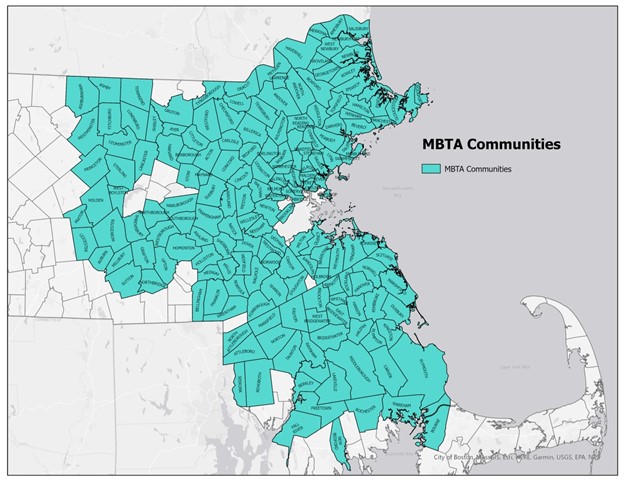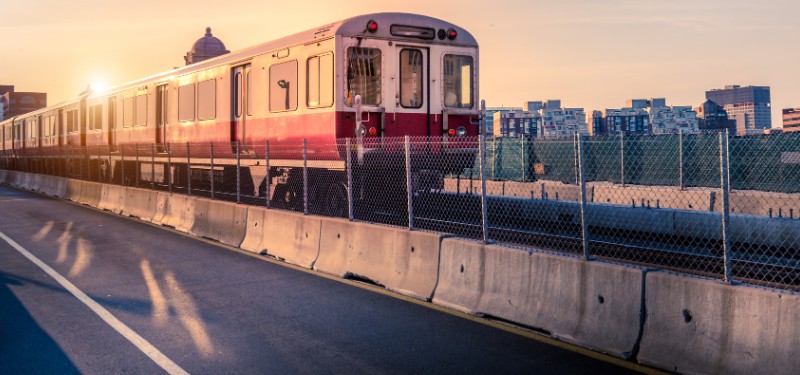After a multi-year effort, in 2022, the Commonwealth of Massachusetts enacted a new law requiring “MBTA Communities” to require zoning for multi-family construction. The law, which is codified at G.L. c. 40A, § 3A, requires certain communities (further described below) to have at least one zoning district of reasonable size within half a mile of MBTA stations in which multi-family housing is permitted as a matter of a right with a minimum gross density of 15 units per acre.
With litigation pending against Milton and a majority of towns not yet having reached the compliance deadline, it is unclear what the outcome of the new zoning requirements will be.
MBTA Communities are defined as cities and towns other than Boston that host MBTA service and their abutters. 177 MBTA communities are subject to the new zoning requirements, as shown on the below map published on the Massachusetts state website.

General Laws c. 40A, § 3A, provides in full, as follows:
Section 3A. (a)(1) An MBTA community shall have a zoning ordinance or by-law that provides for at least 1 district of reasonable size in which multi-family housing is permitted as of right; provided, however, that such multi-family housing shall be without age restrictions and shall be suitable for families with children. For the purposes of this section, a district of reasonable size shall: (i) have a minimum gross density of 15 units per acre, subject to any further limitations imposed by section 40 of chapter 131 and title 5 of the state environmental code established pursuant to section 13 of chapter 21A; and (ii) be located not more than 0.5 miles from a commuter rail station, subway station, ferry terminal or bus station, if applicable.
(b) An MBTA community that fails to comply with this section shall not be eligible for funds from: (i) the Housing Choice Initiative as described by the governor in a message to the general court dated December 11, 2017; (ii) the Local Capital Projects Fund established in section 2EEEE of chapter 29; or (iii) the MassWorks infrastructure program established in section 63 of chapter 23A.
(c) The department, in consultation with the Massachusetts Bay Transportation Authority and the Massachusetts Department of Transportation, shall promulgate guidelines to determine if an MBTA community is in compliance with this section.
The Attorney General is tasked with enforcing the requirements of this new law and issued an Advisory in March 2023 indicating that compliance with the law is required and that opting out of the funds listed in § 3A(b) does not absolve a city or town from the rezoning requirements.
The Executive Office of Housing and Livable Communities (EOHLC) established the following deadlines by which cities and towns must achieve compliance with the new law:
• Communities served by rapid transit must comply by 12/31/2023;
• Communities served by the commuter rail must comply by 12/31/2024;
• Adjacent communities must comply by 12/31/2024; and
• Adjacent small towns must comply by 12/31/2025
Last year, many cities and towns near to Boston, which are served by rapid transit (the main lines of the MBTA), worked to amend local zoning laws in order to achieve compliance with the new MBTA requirements. In Milton, after town officials developed a new compliant zoning plan that was approved at Town Meeting, a town-wide vote was called in February 2024 at which the public rejected the new zoning plan. Milton was the first community to be in violation of the zoning law but is certainly not the last.
Despite the fact that the Attorney General, Andrea Campbell, has sued Milton for its failure to meet the zoning compliance deadline, other cities and towns have expressed frustration and pushed back. Like Milton, the Town of Marshfield voted down a rezoning plan in April of this year, and a group of citizens in Rockport recently filed a lawsuit against the town alleging that the manner in which it intends to comply with the new zoning requirements – through a simple majority vote at Town Meeting rather than a two-thirds majority – is impermissible. Additionally, the Town of Holden has failed to submit an action plan to the state and is considered in violation of the new zoning requirements because of this. Other cities and towns, while not out of compliance, have vocalized concerns and frustrations, but the majority of affected communities do not have to comply with the new rules until the end of this year.
The MBTA zoning requirement was created to help alleviate the housing crisis facing Massachusetts. In addition to issues with overcrowding and public schools’ capacities to educate children living in the denser housing required under the new zoning rules, citizens and town officials around the state have expressed concerns about existing infrastructure’s capacity. As reported by GBH, several towns are concerned that existing sewer and wastewater treatment facilities are not designed to service denser housing, and there is no procedure or funding available to consider expanding or replacing existing systems.
With litigation pending against Milton and a majority of towns not yet having reached the compliance deadline, it is unclear what the outcome of the new zoning requirements will be. The full Supreme Judicial Court is scheduled to hear oral arguments in the Milton case in October, but it is unlikely that a decision will issue in time to guide the 129 communities that are required to file compliant rezoning plans by the end of this year.
MBG will continue to keep its clients apprised of updates concerning the MBTA communities law.


